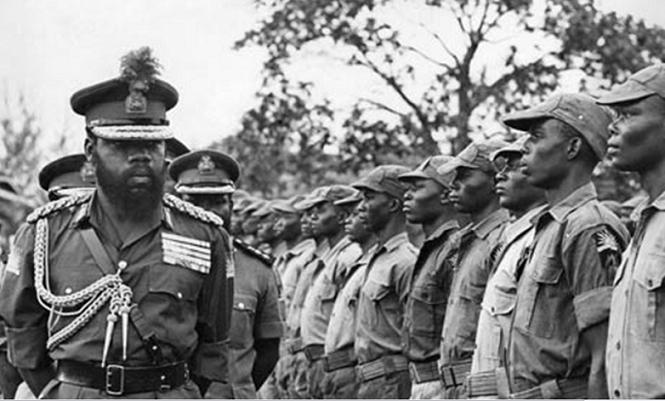The mission of Biafra

Regardless of where in the world Black people are killed or brutalized, the violence is rooted in the white man’s diminution of African life. With their long history of struggle, the people of Biafra who seek to break away from neo-colonial Nigeria want to build for themselves a new civilisation where African life, all human life, fundamentally, is sacrosanct.
It is indeed striking if not extraordinary that quite a few people don’t seem to recognise the underlying features that link the almost routinised murder perpetrated by the police/other agents of the state in Africa on an African people in the streets of Nairobi, Onicha, Igwe Ocha, Aba, Oka, Uzo-Uwani, Bujumbura, Owere, Enuugwu and Asaba, for instance, with the stretch of murders of African-descent people in the United States carried out by police in innumerable cities including, especially, New York, Tulsa, Orlando, Washington DC, Omaha, Baton Rouge, Jacksonville, Dallas, Minnesota, San Francisco, Columbus, Oklahoma City, Las Vegas, Baltimore, Chicago and Los Angeles.
Rubric
These murders, east or west of the Atlantic, are configured and executed under that same overarching ideological rubric of the expressed “diminution-of-African life” that constitutes the engaging, subjugating template of 400 years of pan-European enslavement of the African humanity in the Americas and elsewhere, beginning in the 15th century, and Europe’s consequent occupation of the African homeland itself. Europe’s “Berlin state”-aftermath of this scourge of history in contemporary Africa duly operationalises the agelong legacy.
Thus, the significance of the late 1960s British Prime Minister Harold Wilson’s notorious declaration that he, Harold Wilson, “would accept the death of half a million Biafrans if that was what it took” Britain’s client and co-genocidist Nigeria to destroy the Igbo resistance to the ongoing Igbo genocide (Roger Morris, Uncertain Greatness: Henry Kissinger and American Foreign Policy, 1977: 122) is a reminder to anyone who would wish to think otherwise (in the globe’s post-World War II era) that the raison d’être of the state that would “oversee” the lives of African peoples forthwith wouldn’t differ, significantly, from what Britain and the rest of Europe had constructed, in variegated forms, since the 1490s. The Nigerian executioners on the ground end up murdering 3.1 million Biafrans or 25 per cent of the Igbo population during 44 gruesome months (29 May 1966-12 January 1970) – far in excess of “massa” Harold Wilson’s “half a million Biafrans”-death wish, representing 4.2 per cent of the Igbo.
Just as the murderous gangs of camp overseers in the African enslaved estates in the Americas of earlier epochs, the overseers in present day Africa matrix estate formations, often drawn from constituent African nations opposed to the restoration of African freedom from the pan-European conquest and subjugation (e.g. Hausa-Fulani in a British Nigeria), are primed by the estate to murder conscientiously liberatory and transformative Africans as instantly, overwhelmingly and savagely as they deem fit.
Prize
It is precisely as a result of this devastating tract of antecedent that the soon to be freed Igbo people from genocidist Nigeria occupation have an opportunity to begin to build a new civilisation in Biafra where African life, human life, fundamentally, is sacrosanct. This is the immediate prize of the restoration of Biafran freedom. And Biafrans share this prize with the rest of African humanity – wherever they are emplaced across the world. Surely, for African peoples, 500 years later, this salient goal of Biafra cannot be overstressed. Never again does anyone anywhere on earth devalue African life as a ritualised instrument of state power.
Beginning
Biafra is an inclusive state where women and men live as co-operators and co-creators in fundamentally transforming their society. This is a state that accepts and accords full rights to all its people. This is a state where people enjoy the rights to differ and to dream dreams and dream different sets of dreams as they choose.
Biafra is a state dedicated to furthering and nurturing the resilience of its people and to enable them advance their highest creative endeavours. This state continuously strives to remove all limitations in the paths of its people and is committed to making life better and better and better.
This is a state that tasks its people to flourish. Already, 50 years since the first dreadful murders of the genocide were committed in north Nigeria on Sunday 29 May 1966, Biafrans have written an extraordinary essay on human survival and fortitude, a beacon of the tenacity of the spirit of human overcoming of the most desperate, unimaginable, brutish forces.
Alas, this chokingly long drawn out catastrophe that is at once Britain’s Nigeria hotchpotch and the expanded timeframe of Europe’s totalising hegemony in Africa is over and truly African peoples do stand poised on the eve of a new beginning.
* Herbert Ekwe-Ekwe is visiting professor in the graduate programme of constitutional law at Universidade de Fortaleza, Brazil. He specialises on the state and on genocide and wars in Africa in the post-1966 epoch, beginning with the Igbo genocide, 29 May 1966-12 January 1970, the foundational and most gruesome genocide of post-(European)conquest Africa. Among his books are Longest genocide - since 29 May 1966 (forthcoming, 2016), Readings from Reading: Essays on African Politics, Genocide, Literature (African Renaissance, 2011), Biafra Revisited (African Renaissance, 2006), African Literature in Defence of History: An Essay on Chinua Achebe (Michigan State University Press, 2001), Africa 2001: The State, Human Rights and the People (International Institute for African Research, 1993), and Conflict and Intervention in Africa (Macmillan, 1990).
* THE VIEWS OF THE ABOVE ARTICLE ARE THOSE OF THE AUTHOR AND DO NOT NECESSARILY REFLECT THE VIEWS OF THE PAMBAZUKA NEWS EDITORIAL TEAM
* BROUGHT TO YOU BY PAMBAZUKA NEWS
* Please do not take Pambazuka for granted! Become a Friend of Pambazuka and make a donation NOW to help keep Pambazuka FREE and INDEPENDENT!
* Please send comments to [email=[email protected]]editor[at]pambazuka[dot]org[/email] or comment online at Pambazuka News.
